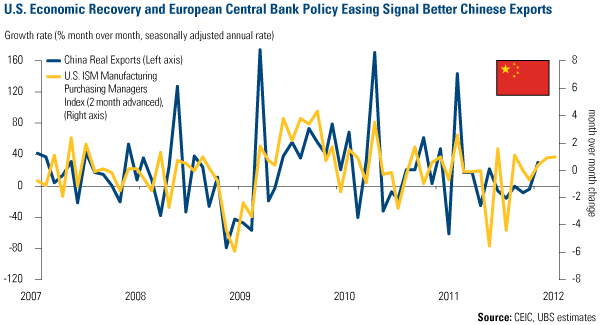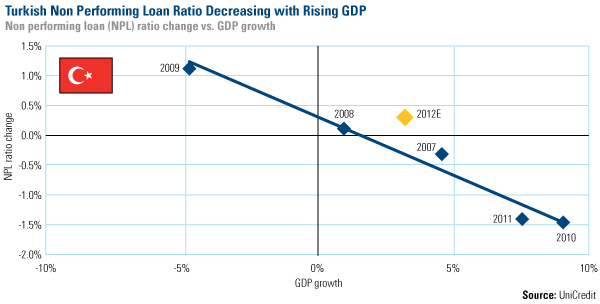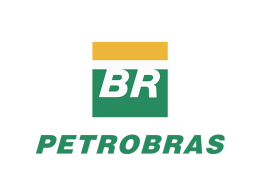Emerging Markets Radar (February 13, 2012)
Strengths
- The People’s Bank of China (PBOC) said on Tuesday that it will ensure first-home purchasers have access to credit, according to a statement published on its website. On Thursday, WUHU, a large city in Anhui Province, relaxed property restrictions, a sign that there are local-level adjustments to assist the housing market.
- China’s January exports were down 0.5 percent, less than the estimate of -1.4 percent, while imports were down 15.3 percent, worse than the market consensus 3.6 percent. There was also the Chinese New Year effect, according to analysts.
- The Natural Resources Defense Council (NRDC) has raised diesel and petro prices across China by roughly 3 percent each.
- Indonesia unexpectedly lowered its benchmark interest rate by 25 basis points to 5.75 percent, a third move after two cuts last year. The lower policy rate will add pressure to commercial banks on their net interest margins, but will be good for corporations and consumers, especially for developers and auto makers.
- Indonesia’s fourth quarter GDP rose 6.49 percent, better than market consensus. For 2011 the economy expanded 6.5 percent, the fastest since 1996.
- Philippine’s Consumer Price Index (CPI) rose 3.9 percent, easing to a 13-month low.
- In Turkey, December industrial production (IP) came in at 3.7 percent year-over-year, better than the consensus estimate of 2.6 percent. While significantly down from 8.4 percent in November, base effects played a large role, as IP last December was very high at 16.7 percent. On a seasonally and working day adjusted basis, IP has been trending up in the second half of 2011.
Weaknesses
- China’s January CPI was up 4.5 percent, higher than the market expectation of 4 percent. The vegetable price was up 26 percent, and was blamed for the higher-than-expected inflation number. The bad news didn’t dampen the market bullishness in China and Hong Kong since the consensus is that the disinflation trend is intact. The Producer Price Index (PPI) was down 0.1 percent for the month.
- Philippine’s exports dropped 20.7 percent year-over-year in December as electronics shipments dropped. The result was worse than expected and was a greater decline than November’s figure.
- The Hungarian regulator has released the latest data on foreign exchange (FX) mortgage repayments in the sector. According to this data, by the end of January 2012, 142,000 people have repaid FX mortgages worth Hungarian forint (HUF) 1,074 billion at spot FX rates and HUF 776 billion at fixed FX rates, causing the banking sector HUF 298 billion pre tax loss. Another 19,000 people have submitted the necessary documents by the deadline and are still expected to pay later on, potentially repaying another HUF 145 billion worth of FX mortgages at spot FX rates and HUF 105 billion at fixed FX rates, potentially causing a further HUF 45 billion pre tax loss to the banks before the whole scheme is wrapped up.
Opportunities
- China’s January exports were better than expected, and may have been supported by improving U.S. recovery in credit, payroll and consumer spending, and by the European Central Bank’s long term refinancing operation (LTRO) in increasing liquidities for European financial institutions. The U.S. ISM Manufacturing Purchasing Managers Index is a leading indicator for Chinese exports as shown below that it is pointing to improved demands for Chinese goods.

- There is generally a very strong correlation between GDP growth and non performing loan ratios of nations’ banks, and Turkey is no exception (see chart below). As evidenced by the strong industrial production number for December, the Turkish economy continues to expand, easing the provision burden on the banks.

Threats
- China’s higher-than-expected CPI for January may delay PBOC’s decision to cut the bank required reserve ratio (RRR).
- Bloomberg reported that Russia may charge a one-time levy on businessmen who acquired assets in “unfair” 1990s state sales, said Prime Minister Vladimir Putin, who is campaigning to return to the presidency in next month’s election. Thursday's Vedomosti suggests that Putin may try to style this one-time "windfall tax" on the U.K. approach. According to the article, in 1997 the U.K. imposed a one-time payment on the owners of assets acquired during privatizations of the 1980s. The payment was a tax of 23 percent on the difference between: a) the average net profit of the privatized companies made in the first four years following privatizations, multiplied by the factor of 9.3 and b) the purchase price.










